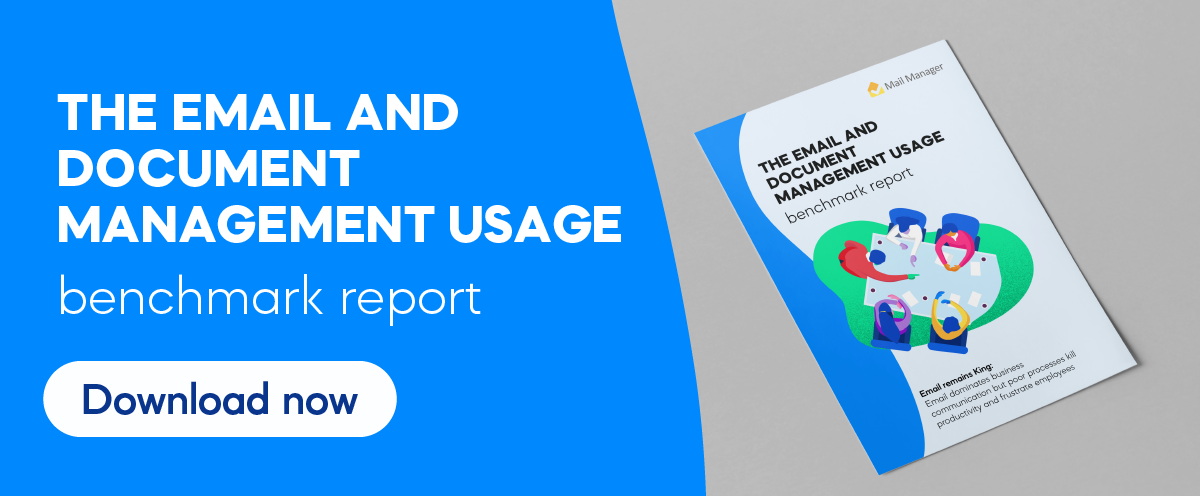Mail Manager research finds 32% of employees spend nearly one working day per week managing inboxes
Email remains easily the most-used and most important communication tool but a lack of email management is having a major impact on business productivity. These are the findings of research revealed in our latest research which surveyed more than 1,000 decision-makers from organisations in the United Kingdom and the United States.
The Email and Document Management Usage Benchmark report reveals one in three employees spend nearly one working day per week managing their inbox, while 91% use email for client communication and 61% prefer to use email over any other form of communication tool, such as Slack or Skype.
However, email also presents one of the biggest productivity drains and workplace stressors. 70% believe it’s one of the biggest productivity drains in the workforce and a further 73% say too much time is spent trying to find emails.
Additional key findings:
- The majority agree that email is an essential part of good record management (87%) and an important part of quality management (84%).
- 62% still keep hard copies of emails.
- A lack of email management can lead to time being wasted (60%) and reduced productivity (50%), but more importantly it also means reduced visibility via a lack of a paper trail (52%).
- Only half (54%) find it easy to find information within their inbox and over half (56%) find it frustrating when it’s difficult to track down specific documents in their email inbox.
- Not all businesses have the right tools in place to manage their emails and documents effectively - less than half (46%) of respondents have a formal system in place to ensure the management of emails and only 35% have a formal system in place for managing their documents.
- On average, 54% of emails are saved and filed for business purposes, most often these are emails relate to specific jobs or projects (72%) or those containing financial information (70%).
Jacob Wardrop, Commercial Director at Mail Manager said: “Email is the letter of today. While tools like Slack and WhatsApp are great for informal correspondence and chat, email remains the core correspondence method for formal communication.
“Before the digital era, companies would send formal correspondence as letters, which would be physically stored. Now, email is the tool for formal correspondence, but the need for filing and securely storing this communication remains, even though it’s digital.”
Poor email management drains productivity
Less than half of organisations (46%) use a formal, paid-for email management solution and only 35% use a dedicated document management solution. As a result, 46% of the respondents said they save or store less than half of their emails, while 62% still keep hard copies of emails. Furthermore, nearly a quarter of respondents (23%) said that email filing isn’t considered part of their quality management procedure.
The knock-on effect of this is employees being left frustrated by not being able to find specific documents in their inbox (56%), which ends up with them wasting time (60%), being less productive (50%) and losing visibility of project information through the lack of a paper trail (52%).
Email remains vital to business communication
Email continues to be used for a wide range of business purposes, with the most common being internal and team communications (74%) and client communication (70%). It’s also vital to tasks like sharing project work internally (68%), sharing contracts (65%) and important documentation (63%), and sharing project work with clients (62%).
The research also highlighted the importance of managing email, with respondents claiming it’s essential to delivering good record management (87%), providing better information visibility (86%) and quality management (84%). While 84% of respondents also claimed that poor email management could have significant consequences for their business.
Wardrop added: “This insight from businesses in the UK and the US shows they face common issues when it comes to email and document management. It’s clear that email remains vital to employees being as effective as possible and maintaining strong relationships with their clients.
“However, businesses still aren’t deploying effective email and document management solutions that make their employees’ lives easier and help them quickly find the documents and information they need when they need it. As a result, people are still being frustrated by wasting time digging through their email inboxes, which means they can’t be as productive as they and their employers want them to be.”
Download the full report on the research here.
Notes
This research surveyed 1,002 business leaders and decision-makers - 500 in the UK and 502 in the US - across a wide range of industries, from accounting, commercial real estate, finance, healthcare, and higher education to legal, manufacturing, oil and gas, and renewables. The survey respondents came from a range of business areas, industries, and ranged from small organisations to large enterprises. The research was conducted in December 2020 by Sapio Research.











